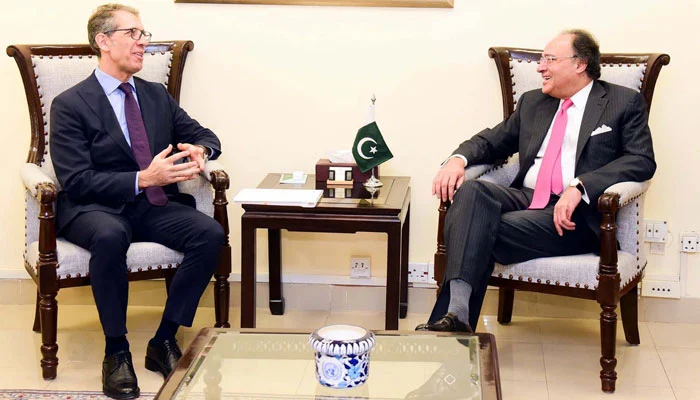ISLAMABAD: International Monetary Fund (IMF) Resident Chief in Pakistan Mahir Binici has highlighted that Pakistan’s inability to Pakistan’s Tax generate sufficient revenues remains a key macroeconomic challenge, contributing to a heavy debt burden.
Taxation Challenges and Economic Burden Pakistan’s Tax

Speaking at the “Retail Reimagined: Innovate, Collaborate & Thrive” conference organized by the Pakistan Retail Business Council (PRBC), Binici pointed out that the formal sector bears a disproportionately high tax burden, while certain sectors remain outside the tax net.
Minister for Finance and Revenues Muhammad Aurangzeb echoed these concerns, stating that while the retail sector contributes 19% to GDP, its tax contribution remains at a mere 1%. He highlighted that formal businesses in retail, tobacco, and beverages are essentially subsidizing the informal sector, which is unsustainable.
“The salaried, manufacturing, and services sectors have been unfairly carrying the tax burden, which cannot continue. It is time for agriculture, retail, wholesale, and real estate sectors to step up,” Aurangzeb stated.
Government’s Strategy to Expand the Tax Net Pakistan’s Tax
To counter tax evasion, the government plans to enforce strict measures against the informal sector and increase documentation. The finance minister emphasized that businesses must formalize their operations for the national interest, as the country can no longer afford widespread tax evasion.
Additionally, artificial intelligence (AI) will be leveraged to improve tax collection. Aurangzeb revealed that Rs9.4 trillion is currently in cash circulation outside the formal economy, and the government is determined to bring this money into the tax net.
Positive Economic Developments Pakistan’s Tax
The minister highlighted significant improvements in Pakistan’s macroeconomic stability:
- Stable Currency: The exchange rate has stabilized.
- Increased Foreign Reserves: Reserves have grown, attracting investor confidence.
- Lower Inflation: A significant drop in inflation has been observed.
- Reduced Interest Rates: The policy rate has decreased, bringing the Karachi Interbank Offered Rate (KIBOR) down from 23% to around 11%.
Foreign investors have started taking notice of Pakistan’s economic potential, with increased investments in both debt and equity markets.
IMF Engagement and Future Economic Prospects
The IMF team is scheduled to visit Pakistan on February 24 to discuss a climate resilience fund, from which Pakistan expects to secure $1 to $1.5 billion. Another IMF mission will visit in March for the six-monthly review under the $7 billion Extended Fund Facility (EFF).
Aurangzeb also confirmed that Pakistan is actively working to improve its international credit rating, aiming for an upgrade to the “Single B” category.
Structural Reforms in Taxation and Governance
A major overhaul of Pakistan’s taxation system is underway, with a focus on:
- Digitization: Enhancing transparency, reducing leakage, and eliminating corruption.
- Faceless Customs: 80% of imports are now cleared within 18-19 hours, compared to the previous 118-hour processing time.
- Pension Reforms: Newly hired government employees are now part of a defined contribution system.
Retail Sector’s Role in the Economy
Chainstore Association of Pakistan (CAP) Chairman Asfandyar Farrukh highlighted that while the formal retail sector contributes 25% of its turnover in taxes, 90% of the retail industry remains informal, paying little to no taxes. This disparity is driving consumers toward informal businesses, further hurting the documented economy.
State Bank of Pakistan Deputy Governor Saleem Ullah emphasized that the digital payment system will be fully implemented within the next five years to encourage transparency and documentation.
FBR’s Efforts to Expand the Tax Net
Federal Board of Revenue (FBR) officials shared key updates:
- Point of Sale (POS) Integration: From just 78 Tier-1 retailers in 2019, the number has now grown to 12,249, generating over 660 million receipts in the last fiscal year.
- Tajir Dost Scheme: While initial results were below expectations, policy measures have led to a significant rise in tax return filings from the retail sector.
- Income Tax Returns: The FBR received six million returns, though many filers submitted nil returns to avoid higher withholding tax rates.
FBR’s Member Inland Revenue Operation, Hamid Ateeq Sarwar, noted that the tax rate for Tier-1 retailers was previously low, but due to IMF conditions, the concessionary tax regime was withdrawn. However, the FBR may consider lower tax rates for the formal sector under specific conditions, subject to IMF approval.
https://www.thenews.com.pk/print/1284973-pakistan-s-inability-to-generate-revenues-key-issue-imf




























